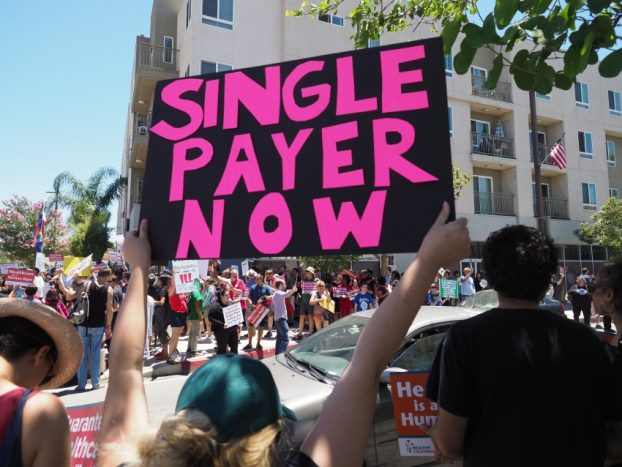 In a new statement from the AFL-CIO, the labor federation states that "our core goal...is to move expeditiously toward a single-payer system, like Medicare for All." The original post can be found here.
In a new statement from the AFL-CIO, the labor federation states that "our core goal...is to move expeditiously toward a single-payer system, like Medicare for All." The original post can be found here.
July 26, 2017
Quality health care should be a basic right in the United States. It should not be a commodity that can be denied because you have too little income, do not have the right job or any job, or have a pre-existing medical condition. Republican leaders in Congress, however, are pursuing an agenda that attacks this principle and undermines everyone’s health care, whether you are covered through a job, an individual plan, Medicaid or Medicare. Each of their attempts, so far, to pass legislation that repeals major parts of the Affordable Care Act has failed, however, largely because tens of millions of Americans have spoken out against their proposals, and because some Republican lawmakers have stood up for working people against these health care cuts despite enormous pressure from within their party.
America’s union workers understand the threat posed by these attacks as much as anyone because we experience the critical importance of health care every day in the work we do. We care for the sick, make nursing homes and hospitals run, and come to patients’ homes to deliver care. We are nurses, doctors and other health care professionals whose expertise and compassion save and improve lives. We advocate for patients day and night and see firsthand the difference that decent health benefits make. We make the medications, equipment and supplies needed to treat the sick. We negotiate with employers for affordable, comprehensive health benefits that cover ourselves and our families. We are directly involved in creating and running patient-centered health plans that cover tens of millions of lives.
There are real problems with the ACA and the health care system more broadly that Congress must address. The misnamed 40% “Cadillac Tax” on high-cost health plans must be repealed before it does more harm to the hard-working men and women who negotiated them. Health care prices continue to go up faster than workers’ pay, and the cost of some prescription drugs is so high that lifesaving treatments are out of reach for individuals and enormous pressure is put on workers’ health plans. Although the ACA has made it possible for many more people to buy comprehensive health plans from insurance companies, it has not guaranteed everyone could afford the health care they need. Instead, many people face steep deductibles, copayments and coinsurance that create overwhelming barriers to care.
Instead of tackling these problems and strengthening health care, the main Republican proposals would take health insurance away from between 22 million and 32 million people and hit many others with higher premiums, worse coverage, and even bigger deductibles and other out-of-pocket costs. People who are sick or who have pre-existing medical conditions could find themselves discriminated against once again, unable to afford the care they need. Millions of working adults struggling to make ends meet would be cut off from Medicaid, and the children, people with disabilities, seniors and pregnant women who count on it could be next as the additional cuts to the rest of the program snowball. Cuts to Medicare’s funding would jeopardize its future. Employers would be let off the hook, no longer required to offer affordable health benefits. Under every one of the Republican proposals, middle-class workers would continue to face the “Cadillac Tax” on their high-quality health plans. At the same time, each of their proposals would repeal some or all of the ACA’s taxes on the wealthy few and corporations, with some versions giving millionaires a $50,000-per-year tax cut on average, and all versions eliminating taxes on health insurance companies and prescription drug makers.
If Congress and President Trump are truly interested in improving health care for working people, there are many things they could do. They could start by addressing problems that matter most to people, like hollowed-out coverage with deductibles that are far too high for the typical person, unjustified spikes in prescription drug prices and the “Cadillac Tax” on high-cost health plans. They also should explore alternatives for providing benefits through public and private plans that are patient centered, like expanding Medicare eligibility, creating a public option or strengthening worker plans. Our core goal, however, is to move expeditiously toward a single-payer system, like Medicare for All, that retains a role for workers’ health plans and in which access to quality, affordable health care is indeed a right for everyone in this country. Regardless of the specific path, it is time for Republican leaders to abandon their partisan health care repeal agenda, and instead work with Democrats to advance bipartisan reforms that improve health care for everyone and move us closer to health care for all.
Published July 31st, 2017Like this post? Consider sharing it on
